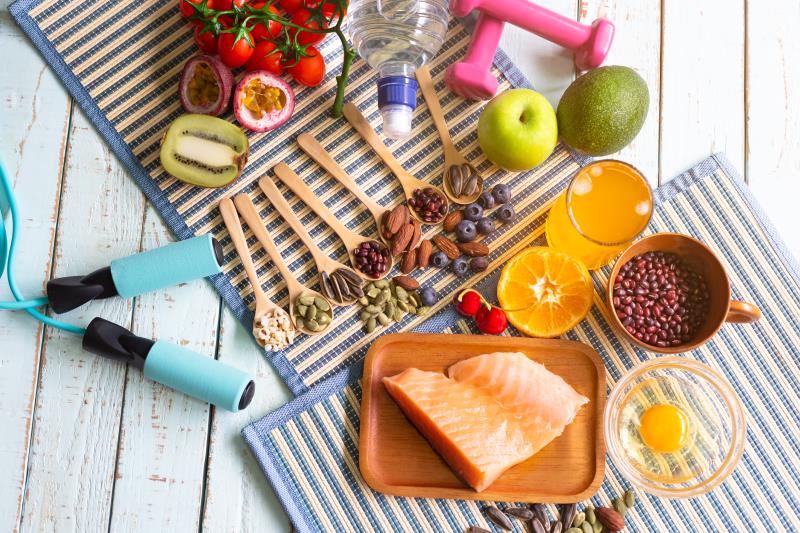Nutrition in the time of COVID-19 pandemic: What to eat, take to bolster immune system





While there is no magic potion or a specific food guaranteed to boost the immune system’s ability to fight a respiratory illness, the general consensus is that consuming a more wholesome diet, administering dietary supplements to at-risk individuals, feeding breast milk to babies, and safe handling of food may help mitigate the risk of COVID-19 and related morbidities.
“To date, there is no vaccine or evidence-based treatment for COVID‐19, the optimization of nutrient intake through well-balanced meals and the use of good hygiene practices in food selection, preparation, and conservation is probably the most effective approach for managing the continuous risk of viral infection,” according to researchers. “To this end, dissemination of healthy eating guidelines for healthcare professionals and the general public is a crucial strategy.”
The researchers conducted a narrative review and summarized recent scientific literature and existing recommendations on an optimal diet, vitamin and mineral supplementation, and good hygiene practices for food preparation during the COVID-19 pandemic.
Thirteen studies were included, covering eight dietary recommendations issued by national and international nutrition agencies, six recommendations released by national governments (Australia, Brazil, Canada, Italy, Spain, US), and five guidelines from health organizations (including the United Nations, World Health Organization, Center for Disease Control and Prevention, and European Food Information Council). [Nutr Rev 2020;doi:10.1093/nutrit/nuaa067]
The researchers outlined four major nutrition-related subjects, stating that the information “can be used to help dietitians and healthcare professionals better address dietary recommendations during the COVID-19 pandemic.”
Wholesome diet
The majority of documents encourage the consumption fruits, vegetables, fatty marine fish, seeds, nuts, and whole grain foods. These foods are rich in vitamins (A, C, D, E, and B complex) and minerals (zinc and selenium), and monounsaturated and polyunsaturated fatty acids, which are important modulators of the immune system. They are also good sources of water, antioxidants, and fibre, all of which offer protection against some of the most important risk factors for COVID-19 complications, namely hypertension, diabetes, and weight gain. [Nutrients 2018;10:1531; Aging 2020;12:6049-6057]
Guidelines and recommendations also urge maintaining adequate hydration and avoidance of or cutting down on salt and sugar intakes. According to a report, diets low in water and rich in salt may impair kidney function, while the consumption of sugary drinks instead of water leads to increased ingestion of carbohydrates and calories, thereby raising blood glucose and exacerbating obesity and other related chronic diseases. [Nutr Rev 2010;68:439-458]
Takeaway: One of the best ways to stay healthy is to eat foods touted as immune boosters, because the immune system requires a constant supply of nutrients to do its job. Messages promoting “healthy diet” or “variety of fresh and unprocessed foods” might not be clear enough to encourage people to make healthy food choices, the researchers said, emphasizing the need to make specific recommendations such as those that include specific examples of food and instructions for food preparation to drive home the message.
Nutritional supplementation
While there are no known supplements to prevent COVID-19, health governing bodies highlight supplementation with vitamins C and D, as well as with zinc and selenium, as potentially beneficial to individuals with or at risk of respiratory viral infections or to those with nutrient deficiency.
Vitamin C is a recognized antioxidant that can heighten chemotaxis, phagocytosis, reactive oxygen species generation, and, ultimately, microbial killing. On the other hand, the purported protective effects of vitamin D underlie increased antimicrobial peptide secretion, decreased chemokine production, inhibition of dendritic cell activation, and altered T-cell activation. [Aliment Pharmacol Ther 2020;51:1434-1437; Vitam Horm 2011;86:217-237; Nutrients 2017;9:1211]
Meanwhile, zinc has been reported to suppress oxidative stress, whereas selenium increases the activity of glutathione peroxidase, another antioxidant enzyme, and boosts a number of host immune responses, including antigen stimulation and natural killer cell activity, among others. [Nutr Diet 2008;65:S41-S47]
Takeaway: Individuals should not rely on supplements to bolster the immune system during the pandemic. The researchers pointed out that obtaining nutrients from foods is way better than getting them from dietary supplements, which are recommended for individuals who have specific challenges in meeting dietary requirements. However, they stressed that the idea of more being better is a misconception. “Megadoses of vitamins and minerals can induce toxic and adverse effects or interact with medications, leading to enhanced or reduced pharmacological effects.”
Breastfeeding benefits
All documents that addressed breastfeeding recommend that the practice be maintained during the COVID-19 pandemic, even in women diagnosed with the disease.
Breast milk is teeming with antibodies that are good for the baby’s immune system, protecting against viral and bacterial infections, the researchers said. Indeed, the World Health Organization promotes exclusive breastfeeding until 6 months of age (no water, other fluids, or solids) and continued until 2 years of age or beyond. [https://www.who.int/nutrition/publications/optimal_duration_of_exc_bfeeding_report_eng.pdf]
Takeaway: Breast milk is the safest and healthiest food for infants. Infected mothers can stay in the same room as their newborns and breastfeed if proper hygiene is exercised, including mask-wearing, handwashing before and after touching the infant, and frequent disinfection of used surfaces.
Takeout and delivery food
There is no convincing evidence that food or food packaging facilitates transmission of COVID-19, but good hygiene practices for handling and preparing foods are strongly advised.
SARS-CoV-2 can survive on metal or plastic surfaces for 3 days and on cardboard surfaces for 1 day, the researchers noted. “In food and beverage stores, the greatest risk of contamination is through contact with other people and ‘high touch’ surfaces such as food scales, shopping-cart handles, and elevator buttons.” [N Engl J Med 2020;382:1564-1567]
Takeaway: Individuals handling and preparing food must take the necessary precautions, such as wearing a mask and frequent handwashing with soap and water or alcohol-based hand sanitizers to reduce the risk of viral dissemination.